Reflective Journal: Analyzing Teaching Experience with the Gibbs Model
VerifiedAdded on 2023/01/10
|7
|1761
|97
Journal and Reflective Writing
AI Summary
This reflective journal entry details a student's experience during a teaching placement, utilizing the Gibbs model for analysis. The journal describes a specific incident where the student struggled to deliver a lesson on fractions, leading to feelings of anxiety and humiliation. The student's feelings, evaluation of the situation, and analysis of the events are presented, along with a conclusion and an action plan for future improvement. The analysis highlights the need for improved communication, confidence-building, and interpersonal skills, as well as strategies for building relationships with colleagues and supervisors. The journal emphasizes the importance of self-reflection and proactive measures to overcome challenges in a teaching environment. The Gibbs model is used to dissect the experience into stages, providing a structured approach to understanding the situation and formulating strategies for personal and professional development.
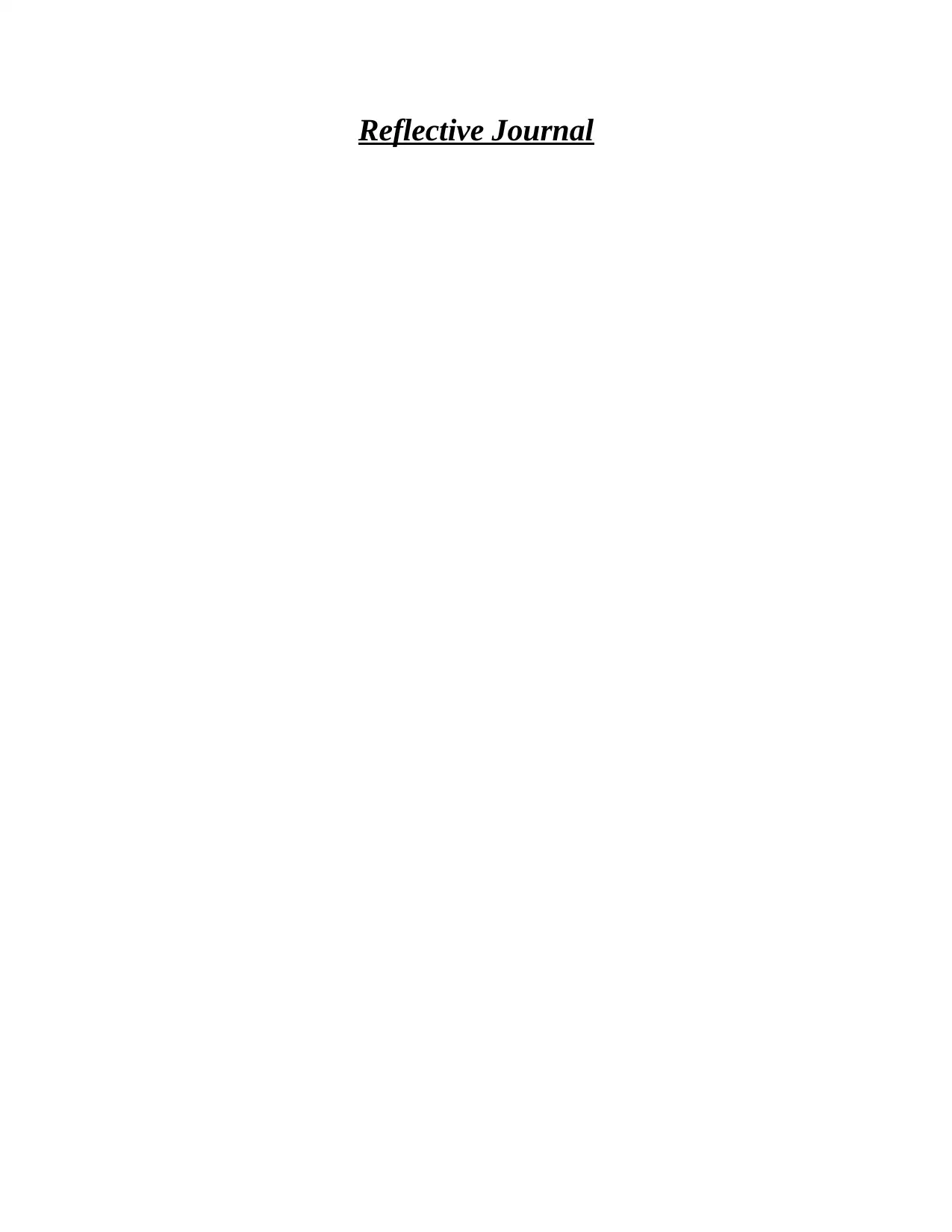
Reflective Journal
Paraphrase This Document
Need a fresh take? Get an instant paraphrase of this document with our AI Paraphraser
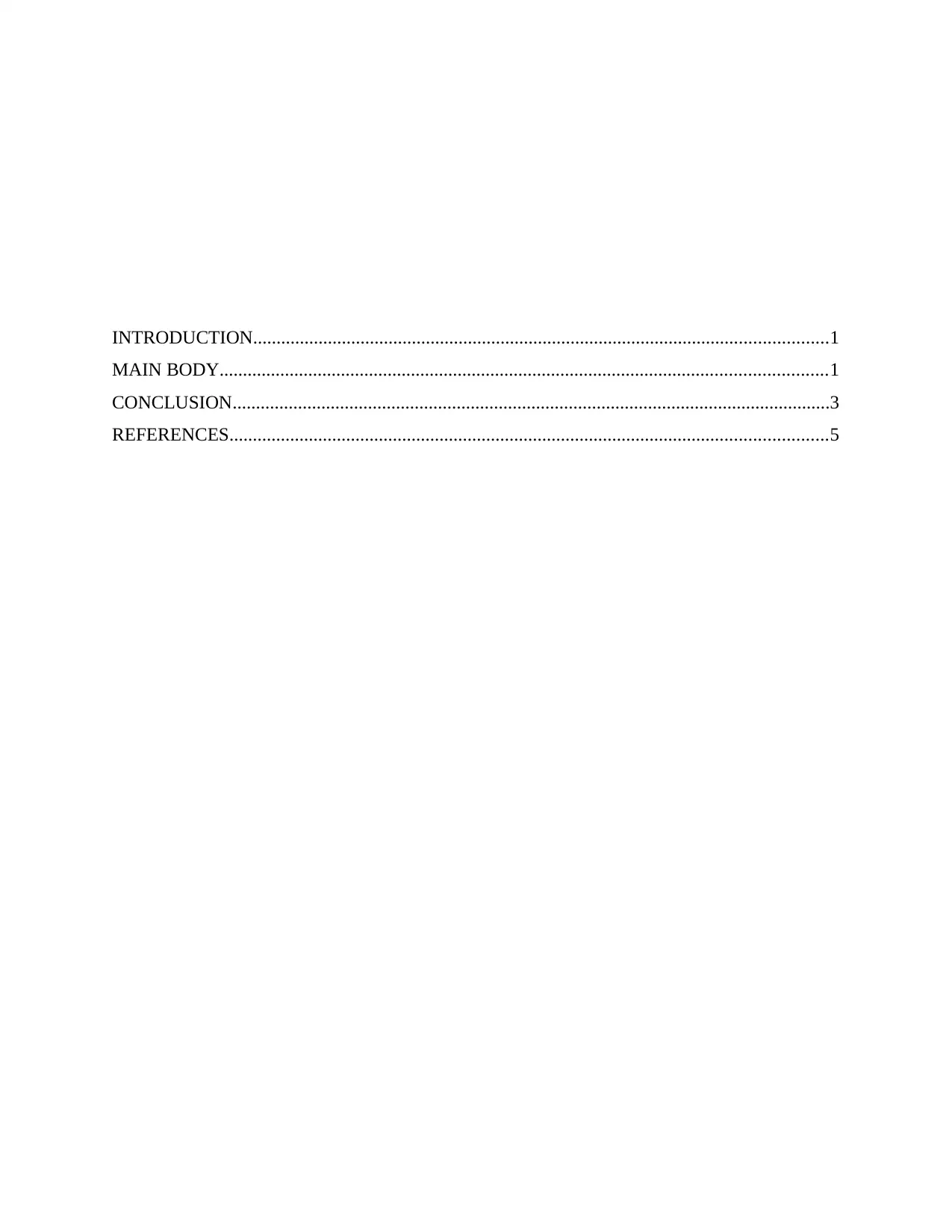
INTRODUCTION...........................................................................................................................1
MAIN BODY..................................................................................................................................1
CONCLUSION................................................................................................................................3
REFERENCES................................................................................................................................5
MAIN BODY..................................................................................................................................1
CONCLUSION................................................................................................................................3
REFERENCES................................................................................................................................5
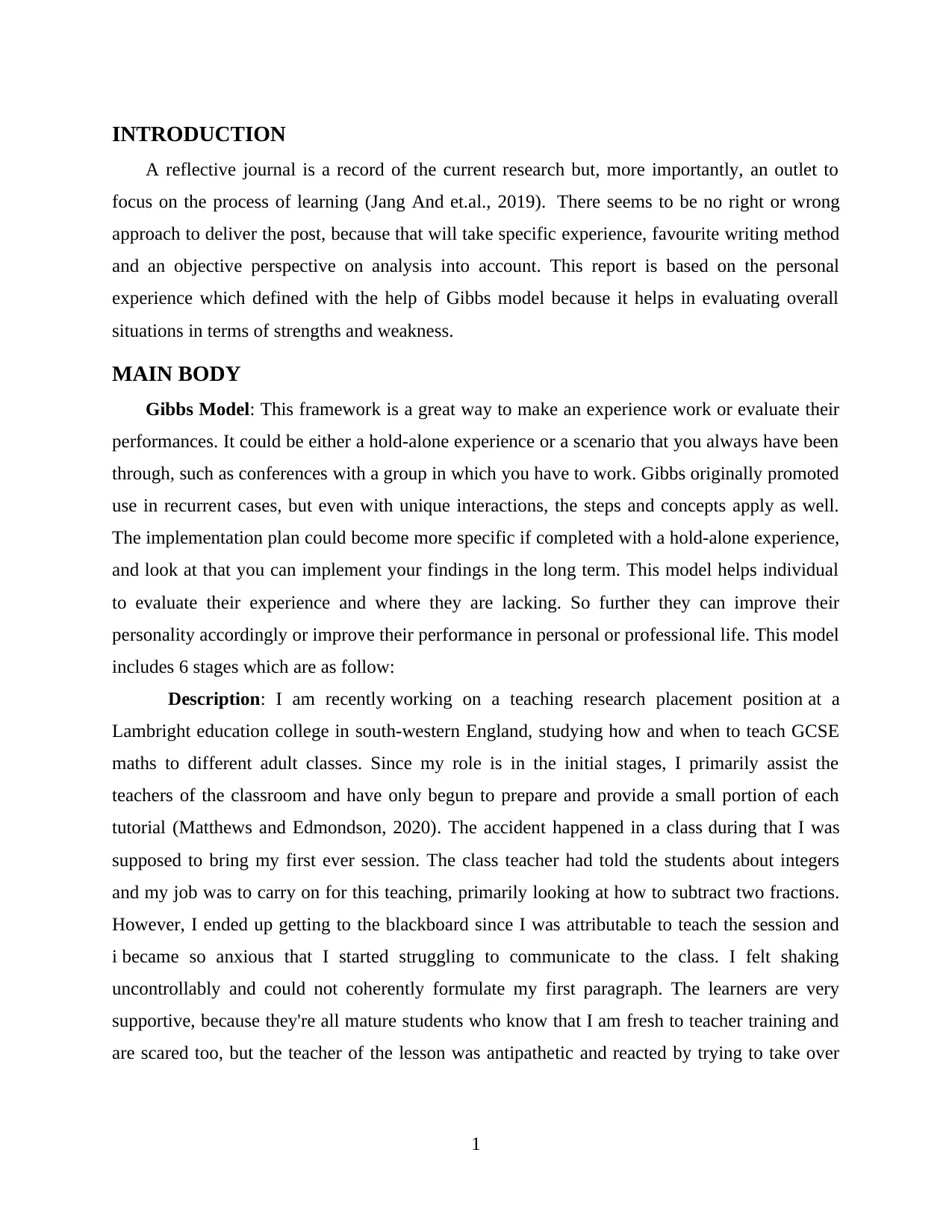
INTRODUCTION
A reflective journal is a record of the current research but, more importantly, an outlet to
focus on the process of learning (Jang And et.al., 2019). There seems to be no right or wrong
approach to deliver the post, because that will take specific experience, favourite writing method
and an objective perspective on analysis into account. This report is based on the personal
experience which defined with the help of Gibbs model because it helps in evaluating overall
situations in terms of strengths and weakness.
MAIN BODY
Gibbs Model: This framework is a great way to make an experience work or evaluate their
performances. It could be either a hold-alone experience or a scenario that you always have been
through, such as conferences with a group in which you have to work. Gibbs originally promoted
use in recurrent cases, but even with unique interactions, the steps and concepts apply as well.
The implementation plan could become more specific if completed with a hold-alone experience,
and look at that you can implement your findings in the long term. This model helps individual
to evaluate their experience and where they are lacking. So further they can improve their
personality accordingly or improve their performance in personal or professional life. This model
includes 6 stages which are as follow:
Description: I am recently working on a teaching research placement position at a
Lambright education college in south-western England, studying how and when to teach GCSE
maths to different adult classes. Since my role is in the initial stages, I primarily assist the
teachers of the classroom and have only begun to prepare and provide a small portion of each
tutorial (Matthews and Edmondson, 2020). The accident happened in a class during that I was
supposed to bring my first ever session. The class teacher had told the students about integers
and my job was to carry on for this teaching, primarily looking at how to subtract two fractions.
However, I ended up getting to the blackboard since I was attributable to teach the session and
i became so anxious that I started struggling to communicate to the class. I felt shaking
uncontrollably and could not coherently formulate my first paragraph. The learners are very
supportive, because they're all mature students who know that I am fresh to teacher training and
are scared too, but the teacher of the lesson was antipathetic and reacted by trying to take over
1
A reflective journal is a record of the current research but, more importantly, an outlet to
focus on the process of learning (Jang And et.al., 2019). There seems to be no right or wrong
approach to deliver the post, because that will take specific experience, favourite writing method
and an objective perspective on analysis into account. This report is based on the personal
experience which defined with the help of Gibbs model because it helps in evaluating overall
situations in terms of strengths and weakness.
MAIN BODY
Gibbs Model: This framework is a great way to make an experience work or evaluate their
performances. It could be either a hold-alone experience or a scenario that you always have been
through, such as conferences with a group in which you have to work. Gibbs originally promoted
use in recurrent cases, but even with unique interactions, the steps and concepts apply as well.
The implementation plan could become more specific if completed with a hold-alone experience,
and look at that you can implement your findings in the long term. This model helps individual
to evaluate their experience and where they are lacking. So further they can improve their
personality accordingly or improve their performance in personal or professional life. This model
includes 6 stages which are as follow:
Description: I am recently working on a teaching research placement position at a
Lambright education college in south-western England, studying how and when to teach GCSE
maths to different adult classes. Since my role is in the initial stages, I primarily assist the
teachers of the classroom and have only begun to prepare and provide a small portion of each
tutorial (Matthews and Edmondson, 2020). The accident happened in a class during that I was
supposed to bring my first ever session. The class teacher had told the students about integers
and my job was to carry on for this teaching, primarily looking at how to subtract two fractions.
However, I ended up getting to the blackboard since I was attributable to teach the session and
i became so anxious that I started struggling to communicate to the class. I felt shaking
uncontrollably and could not coherently formulate my first paragraph. The learners are very
supportive, because they're all mature students who know that I am fresh to teacher training and
are scared too, but the teacher of the lesson was antipathetic and reacted by trying to take over
1
⊘ This is a preview!⊘
Do you want full access?
Subscribe today to unlock all pages.

Trusted by 1+ million students worldwide
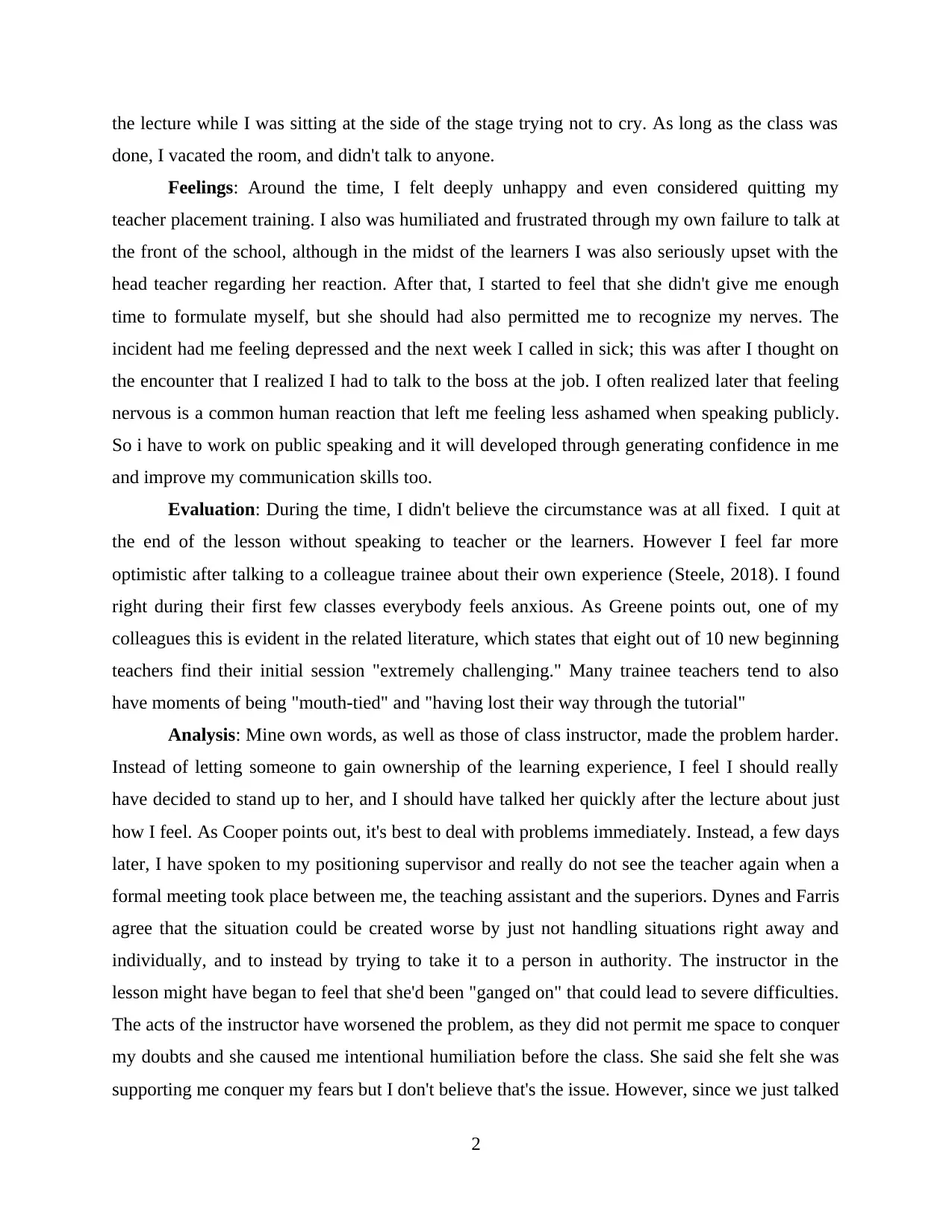
the lecture while I was sitting at the side of the stage trying not to cry. As long as the class was
done, I vacated the room, and didn't talk to anyone.
Feelings: Around the time, I felt deeply unhappy and even considered quitting my
teacher placement training. I also was humiliated and frustrated through my own failure to talk at
the front of the school, although in the midst of the learners I was also seriously upset with the
head teacher regarding her reaction. After that, I started to feel that she didn't give me enough
time to formulate myself, but she should had also permitted me to recognize my nerves. The
incident had me feeling depressed and the next week I called in sick; this was after I thought on
the encounter that I realized I had to talk to the boss at the job. I often realized later that feeling
nervous is a common human reaction that left me feeling less ashamed when speaking publicly.
So i have to work on public speaking and it will developed through generating confidence in me
and improve my communication skills too.
Evaluation: During the time, I didn't believe the circumstance was at all fixed. I quit at
the end of the lesson without speaking to teacher or the learners. However I feel far more
optimistic after talking to a colleague trainee about their own experience (Steele, 2018). I found
right during their first few classes everybody feels anxious. As Greene points out, one of my
colleagues this is evident in the related literature, which states that eight out of 10 new beginning
teachers find their initial session "extremely challenging." Many trainee teachers tend to also
have moments of being "mouth-tied" and "having lost their way through the tutorial"
Analysis: Mine own words, as well as those of class instructor, made the problem harder.
Instead of letting someone to gain ownership of the learning experience, I feel I should really
have decided to stand up to her, and I should have talked her quickly after the lecture about just
how I feel. As Cooper points out, it's best to deal with problems immediately. Instead, a few days
later, I have spoken to my positioning supervisor and really do not see the teacher again when a
formal meeting took place between me, the teaching assistant and the superiors. Dynes and Farris
agree that the situation could be created worse by just not handling situations right away and
individually, and to instead by trying to take it to a person in authority. The instructor in the
lesson might have began to feel that she'd been "ganged on" that could lead to severe difficulties.
The acts of the instructor have worsened the problem, as they did not permit me space to conquer
my doubts and she caused me intentional humiliation before the class. She said she felt she was
supporting me conquer my fears but I don't believe that's the issue. However, since we just talked
2
done, I vacated the room, and didn't talk to anyone.
Feelings: Around the time, I felt deeply unhappy and even considered quitting my
teacher placement training. I also was humiliated and frustrated through my own failure to talk at
the front of the school, although in the midst of the learners I was also seriously upset with the
head teacher regarding her reaction. After that, I started to feel that she didn't give me enough
time to formulate myself, but she should had also permitted me to recognize my nerves. The
incident had me feeling depressed and the next week I called in sick; this was after I thought on
the encounter that I realized I had to talk to the boss at the job. I often realized later that feeling
nervous is a common human reaction that left me feeling less ashamed when speaking publicly.
So i have to work on public speaking and it will developed through generating confidence in me
and improve my communication skills too.
Evaluation: During the time, I didn't believe the circumstance was at all fixed. I quit at
the end of the lesson without speaking to teacher or the learners. However I feel far more
optimistic after talking to a colleague trainee about their own experience (Steele, 2018). I found
right during their first few classes everybody feels anxious. As Greene points out, one of my
colleagues this is evident in the related literature, which states that eight out of 10 new beginning
teachers find their initial session "extremely challenging." Many trainee teachers tend to also
have moments of being "mouth-tied" and "having lost their way through the tutorial"
Analysis: Mine own words, as well as those of class instructor, made the problem harder.
Instead of letting someone to gain ownership of the learning experience, I feel I should really
have decided to stand up to her, and I should have talked her quickly after the lecture about just
how I feel. As Cooper points out, it's best to deal with problems immediately. Instead, a few days
later, I have spoken to my positioning supervisor and really do not see the teacher again when a
formal meeting took place between me, the teaching assistant and the superiors. Dynes and Farris
agree that the situation could be created worse by just not handling situations right away and
individually, and to instead by trying to take it to a person in authority. The instructor in the
lesson might have began to feel that she'd been "ganged on" that could lead to severe difficulties.
The acts of the instructor have worsened the problem, as they did not permit me space to conquer
my doubts and she caused me intentional humiliation before the class. She said she felt she was
supporting me conquer my fears but I don't believe that's the issue. However, since we just talked
2
Paraphrase This Document
Need a fresh take? Get an instant paraphrase of this document with our AI Paraphraser
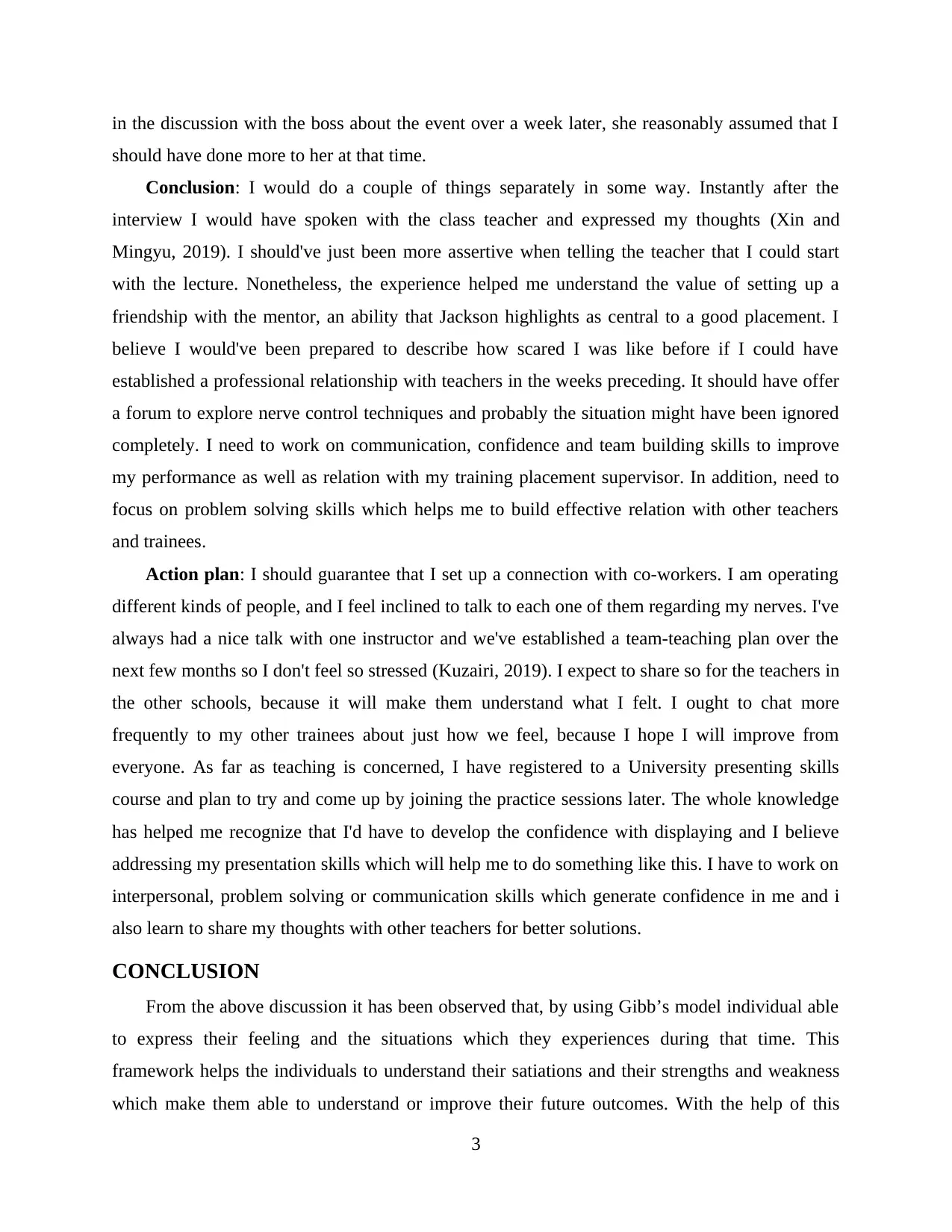
in the discussion with the boss about the event over a week later, she reasonably assumed that I
should have done more to her at that time.
Conclusion: I would do a couple of things separately in some way. Instantly after the
interview I would have spoken with the class teacher and expressed my thoughts (Xin and
Mingyu, 2019). I should've just been more assertive when telling the teacher that I could start
with the lecture. Nonetheless, the experience helped me understand the value of setting up a
friendship with the mentor, an ability that Jackson highlights as central to a good placement. I
believe I would've been prepared to describe how scared I was like before if I could have
established a professional relationship with teachers in the weeks preceding. It should have offer
a forum to explore nerve control techniques and probably the situation might have been ignored
completely. I need to work on communication, confidence and team building skills to improve
my performance as well as relation with my training placement supervisor. In addition, need to
focus on problem solving skills which helps me to build effective relation with other teachers
and trainees.
Action plan: I should guarantee that I set up a connection with co-workers. I am operating
different kinds of people, and I feel inclined to talk to each one of them regarding my nerves. I've
always had a nice talk with one instructor and we've established a team-teaching plan over the
next few months so I don't feel so stressed (Kuzairi, 2019). I expect to share so for the teachers in
the other schools, because it will make them understand what I felt. I ought to chat more
frequently to my other trainees about just how we feel, because I hope I will improve from
everyone. As far as teaching is concerned, I have registered to a University presenting skills
course and plan to try and come up by joining the practice sessions later. The whole knowledge
has helped me recognize that I'd have to develop the confidence with displaying and I believe
addressing my presentation skills which will help me to do something like this. I have to work on
interpersonal, problem solving or communication skills which generate confidence in me and i
also learn to share my thoughts with other teachers for better solutions.
CONCLUSION
From the above discussion it has been observed that, by using Gibb’s model individual able
to express their feeling and the situations which they experiences during that time. This
framework helps the individuals to understand their satiations and their strengths and weakness
which make them able to understand or improve their future outcomes. With the help of this
3
should have done more to her at that time.
Conclusion: I would do a couple of things separately in some way. Instantly after the
interview I would have spoken with the class teacher and expressed my thoughts (Xin and
Mingyu, 2019). I should've just been more assertive when telling the teacher that I could start
with the lecture. Nonetheless, the experience helped me understand the value of setting up a
friendship with the mentor, an ability that Jackson highlights as central to a good placement. I
believe I would've been prepared to describe how scared I was like before if I could have
established a professional relationship with teachers in the weeks preceding. It should have offer
a forum to explore nerve control techniques and probably the situation might have been ignored
completely. I need to work on communication, confidence and team building skills to improve
my performance as well as relation with my training placement supervisor. In addition, need to
focus on problem solving skills which helps me to build effective relation with other teachers
and trainees.
Action plan: I should guarantee that I set up a connection with co-workers. I am operating
different kinds of people, and I feel inclined to talk to each one of them regarding my nerves. I've
always had a nice talk with one instructor and we've established a team-teaching plan over the
next few months so I don't feel so stressed (Kuzairi, 2019). I expect to share so for the teachers in
the other schools, because it will make them understand what I felt. I ought to chat more
frequently to my other trainees about just how we feel, because I hope I will improve from
everyone. As far as teaching is concerned, I have registered to a University presenting skills
course and plan to try and come up by joining the practice sessions later. The whole knowledge
has helped me recognize that I'd have to develop the confidence with displaying and I believe
addressing my presentation skills which will help me to do something like this. I have to work on
interpersonal, problem solving or communication skills which generate confidence in me and i
also learn to share my thoughts with other teachers for better solutions.
CONCLUSION
From the above discussion it has been observed that, by using Gibb’s model individual able
to express their feeling and the situations which they experiences during that time. This
framework helps the individuals to understand their satiations and their strengths and weakness
which make them able to understand or improve their future outcomes. With the help of this
3
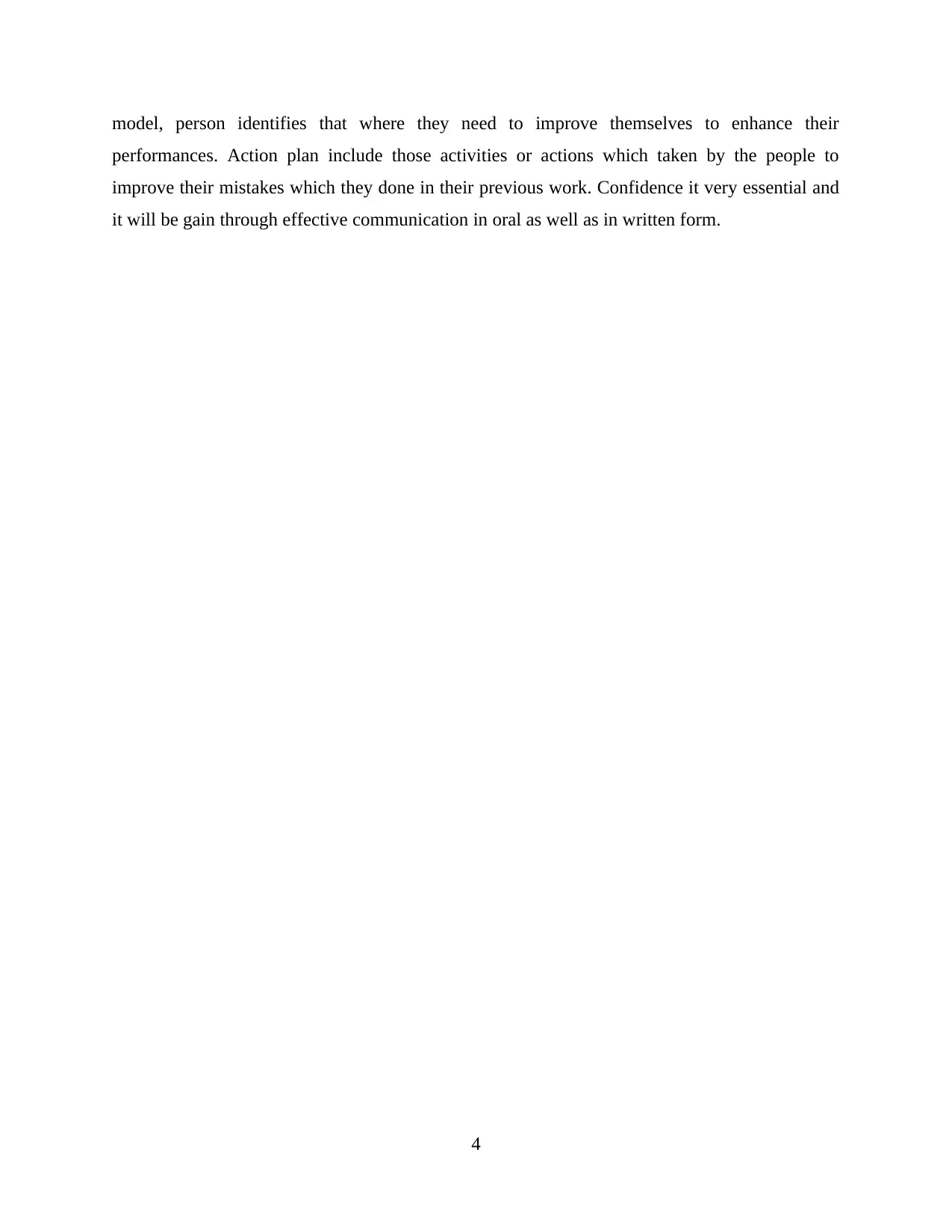
model, person identifies that where they need to improve themselves to enhance their
performances. Action plan include those activities or actions which taken by the people to
improve their mistakes which they done in their previous work. Confidence it very essential and
it will be gain through effective communication in oral as well as in written form.
4
performances. Action plan include those activities or actions which taken by the people to
improve their mistakes which they done in their previous work. Confidence it very essential and
it will be gain through effective communication in oral as well as in written form.
4
⊘ This is a preview!⊘
Do you want full access?
Subscribe today to unlock all pages.

Trusted by 1+ million students worldwide
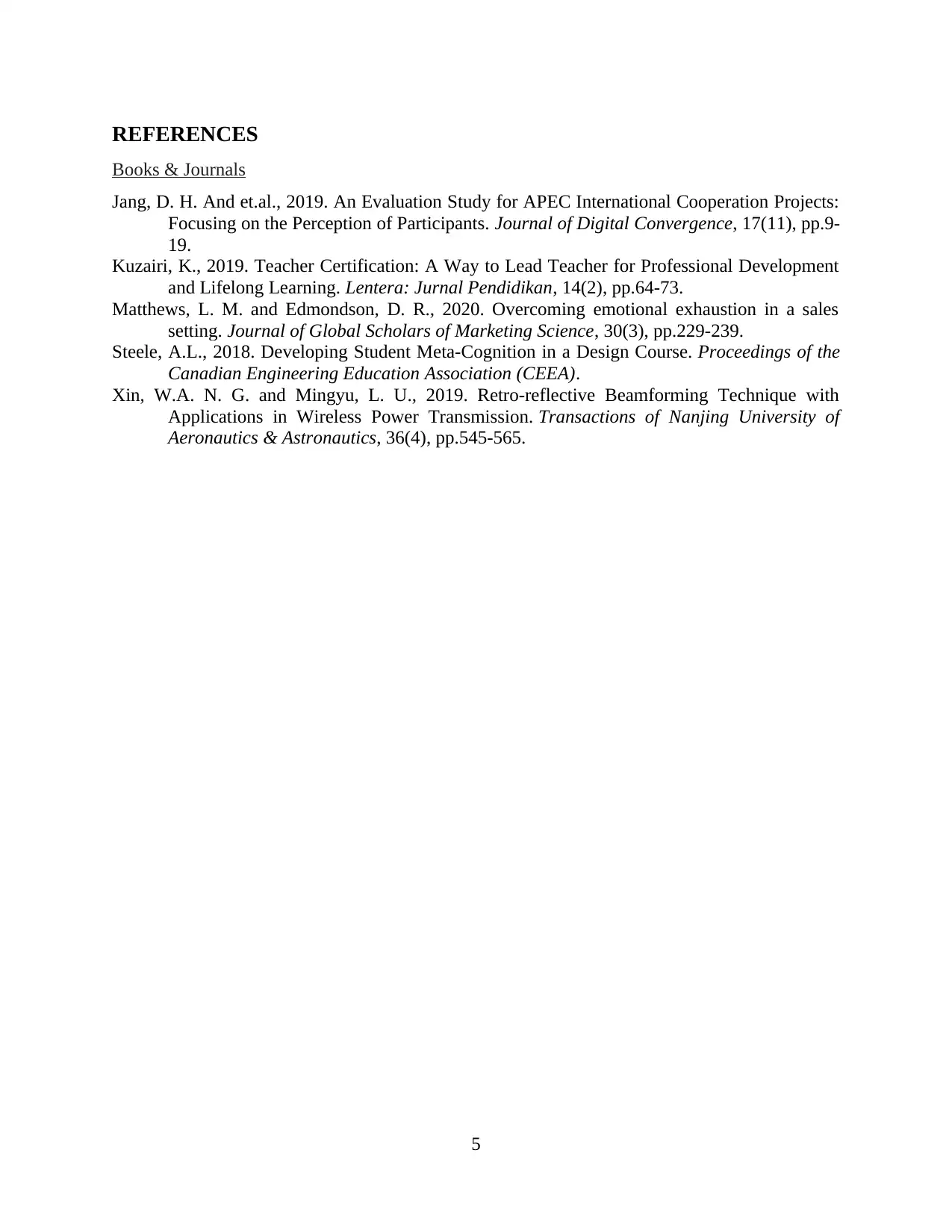
REFERENCES
Books & Journals
Jang, D. H. And et.al., 2019. An Evaluation Study for APEC International Cooperation Projects:
Focusing on the Perception of Participants. Journal of Digital Convergence, 17(11), pp.9-
19.
Kuzairi, K., 2019. Teacher Certification: A Way to Lead Teacher for Professional Development
and Lifelong Learning. Lentera: Jurnal Pendidikan, 14(2), pp.64-73.
Matthews, L. M. and Edmondson, D. R., 2020. Overcoming emotional exhaustion in a sales
setting. Journal of Global Scholars of Marketing Science, 30(3), pp.229-239.
Steele, A.L., 2018. Developing Student Meta-Cognition in a Design Course. Proceedings of the
Canadian Engineering Education Association (CEEA).
Xin, W.A. N. G. and Mingyu, L. U., 2019. Retro-reflective Beamforming Technique with
Applications in Wireless Power Transmission. Transactions of Nanjing University of
Aeronautics & Astronautics, 36(4), pp.545-565.
5
Books & Journals
Jang, D. H. And et.al., 2019. An Evaluation Study for APEC International Cooperation Projects:
Focusing on the Perception of Participants. Journal of Digital Convergence, 17(11), pp.9-
19.
Kuzairi, K., 2019. Teacher Certification: A Way to Lead Teacher for Professional Development
and Lifelong Learning. Lentera: Jurnal Pendidikan, 14(2), pp.64-73.
Matthews, L. M. and Edmondson, D. R., 2020. Overcoming emotional exhaustion in a sales
setting. Journal of Global Scholars of Marketing Science, 30(3), pp.229-239.
Steele, A.L., 2018. Developing Student Meta-Cognition in a Design Course. Proceedings of the
Canadian Engineering Education Association (CEEA).
Xin, W.A. N. G. and Mingyu, L. U., 2019. Retro-reflective Beamforming Technique with
Applications in Wireless Power Transmission. Transactions of Nanjing University of
Aeronautics & Astronautics, 36(4), pp.545-565.
5
1 out of 7
Related Documents
Your All-in-One AI-Powered Toolkit for Academic Success.
+13062052269
info@desklib.com
Available 24*7 on WhatsApp / Email
![[object Object]](/_next/static/media/star-bottom.7253800d.svg)
Unlock your academic potential
Copyright © 2020–2026 A2Z Services. All Rights Reserved. Developed and managed by ZUCOL.





